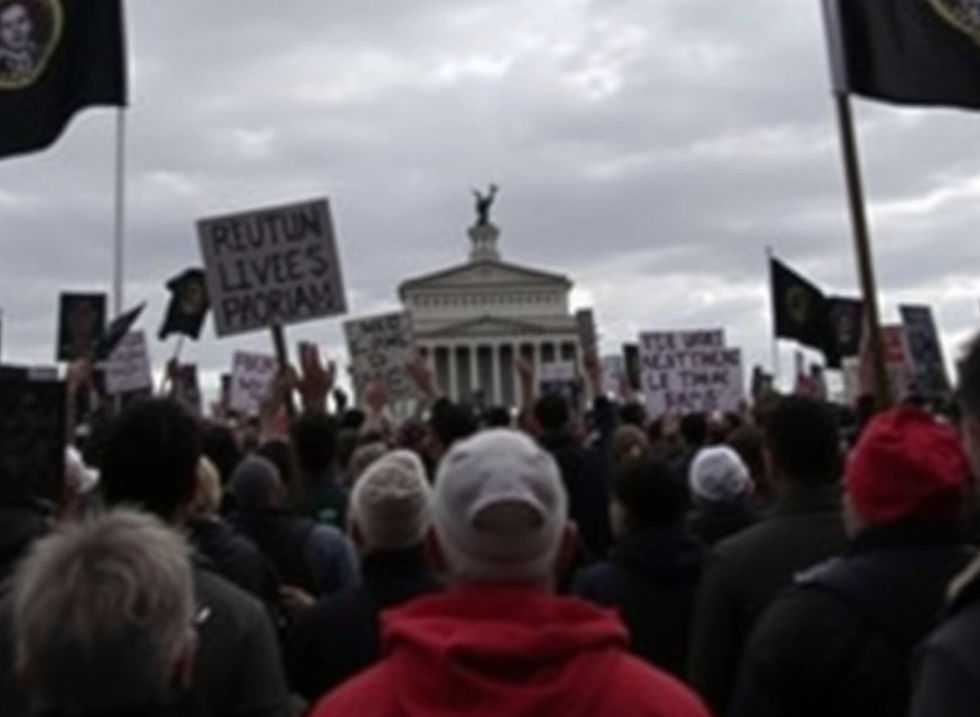Review: The Demonizing of Charlie Kirk and the Legacy of the “Included Middle”
- Sep 22, 2025
- 3 min read

A Review of Scott Masson’s Essay Published in Epoch Times.
Scott Masson’s essay, “The Demonizing of Charlie Kirk by the ‘Included Middle’” (Epoch Times), is more than a commentary on one man’s tragic death. It is a meditation on the intellectual climate that for over half a century has shaped the way Americans argue, disagree, and ultimately dehumanize one another. By situating Charlie Kirk’s assassination in this broader cultural framework, Masson challenges us to examine how deeply inherited habits of suspicion have warped public discourse.
Language, Truth, and the 1960s Legacy
Masson argues that Kirk’s critics were not simply attacking his policies or personality. Instead, they were animated by a set of intellectual assumptions about language and truth, specific assumptions nurtured in the universities since the 1960s. These theories, rooted in leftist critiques of meaning, treated truth not as a reality to be discovered but as a mask for domination and allowed for such nonsense as "your truth is not the same as my truth,” where the very meaning of 'truth' was conflated with 'belief'.
Here Michel Foucault looms large. In The Archaeology of Knowledge (1969), he argued that discourses themselves define what counts as truth, shaping not only how we speak but what we are capable of thinking. In Discipline and Punish (1975), Foucault pressed further, famously opining that “power and knowledge directly imply one another,” insisting that truth claims are inseparable from systems of control. In his words, “each society has its regime of truth, its ‘general politics’ of truth—the types of discourse which it accepts and makes function as true.”
Masson’s point is that this suspicion of truth, now deeply embedded in higher education, provides the lens through which Kirk was viewed. By affirming the existence of stable categories (truth, human dignity, moral reality), Kirk was not merely disagreeing with opponents. He was challenging the very linguistic and anthropological framework that has dominated American intellectual life for two generations. His demonization, Masson suggests, arose not only from political disagreement but from his refusal to yield to this Foucauldian inheritance.
The “Included Middle”
Masson also identifies what he calls the “Included Middle”—those who present themselves as moderates, neither extreme left nor extreme right, yet who nonetheless perpetuate the habits of caricature and suspicion. This “middle” often congratulates itself for its balance, but in practice, it repeats the same dehumanizing patterns that dominate the extremes.
The constructive challenge of Masson’s essay is that moderation must mean more than occupying the political center. It must mean cultivating the discipline of engaging opponents as human beings, refusing to participate in the culture of suspicion, mockery, and innuendo.
Practices to Resist Demonization
Masson’s essay can be read as a call to renewal in public discourse. If our civic culture has been shaped by Foucault’s suspicion, then perhaps it is time to recover a richer view of language—one that admits both the reality of truth and the dignity of persons. Several practices emerge from this:
Recover human dignity: Recognize opponents first as human beings, not symbols of a movement.
Distinguish critique from dehumanization: Ideas must be tested rigorously, but persons must not be reduced to caricatures.
Resist the hermeneutics of suspicion: Not every claim to truth is a disguise for power; sincerity deserves the benefit of the doubt.
Call the “middle” to accountability: Those who claim moderation must exemplify responsible discourse, not merely temperate posturing.
Conclusion: A Positive Vision
Masson’s enduring contribution lies in his insistence that the demonization of Charlie Kirk is symptomatic of a larger intellectual crisis. For over fifty years, the Foucauldian suspicion of truth has encouraged us to see every utterance as a weapon, every appeal to human nature as a mask for oppression. Kirk’s assassination reveals the tragic consequence of this way of thinking.
Yet Masson also offers a hopeful path forward. If demonization is the symptom, the cure is not merely civility but intellectual honesty—the courage to acknowledge truth, to affirm human dignity, and to resist the temptation to turn adversaries into enemies. By recovering these practices, we may yet restore public discourse to its rightful place: a forum where disagreement sharpens our understanding rather than destroys our humanity.




Comments